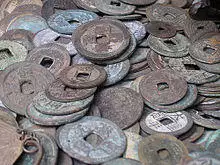cash
In economics, cash (/kæʃ/ or /ˈkeiʃ/ kaysh in Australian English) is money in the physical form of currency, such as banknotes and coins. In bookkeeping and finance, cash is current assets comprising currency or currency equivalents that can be accessed immediately or near-immediately (as in the case of money market accounts). Cash is seen either as a reserve for payments, in case of a structural or incidental negative cash flow or as a way to avoid a downturn on financial markets.
The English word "cash" originally meant "money box", and later came to have a secondary meaning "money". This secondary usage became the sole meaning in the 18th century. The word "cash" derives from the Middle French caisse ("money box"), which derives from the Old Italian cassa, and ultimately from the Latin capsa ("box").
"To cash", the verbalization of the noun, means "to convert to cash", as in the expression "to cash a cheque"
Traditional holed Chinese coinage is also known as cash.

Paper money was first used in China in the Tang Dynasty 500 years prior to it catching on in Europe. During his visit to China in the 13th century, Marco Polo was amazed to find that people traded paper money for goods rather than valuable coins made of silver or gold. He wrote extensively about how the Great Kaan used a part of the Mulberry Tree [桑树] to create the paper money as well as the process with which a seal was used to impress on the paper to authenticate it. Marco Polo also talks about the chance of forgery and states that someone caught forging money would be punished with death. In the 17th century European countries started to use paper money in part due to a shortage of precious metals, leading to less coins being produced and put into circulation.
Cash is increasing in circulation. The value of the United States dollar in circulation increased by 42% from 2007 to 2012. The value of pound sterling banknotes in circulation increased by 29% from 2008 to 2013. The value of the euro in circulation increased by 34% from August 2008 to August 2013 (2% of the increase was due to the adoption of euro in Slovakia [斯洛伐克] 2009 and in Estonia [爱沙尼亚] 2011).
A cashless society can be defined as one in which all financial transactions are handled through "digital" forms (debit and credit cards) in preference to cash (physical banknotes and coins). Cashless societies have been a part of history from the very beginning of human existence. Barter [以货易货] and other methods of exchange were used to conduct a wide variety of trade transactions during this time period.
Overspending is a serious concern in a cashless society. It is much easier to anyone to lose track of how much money is spent when using a debit or credit card.
Digital currency is a generic term for various approaches to support secure transactions of the public or using a distributed ledger, like blockchain, as a new technology for decentralized asset management. It considers establishing an electronic version of the national currency which is backed by the central bank as the issuer. Virtual currency is a digital representation of value that is neither issued by a central bank or a public authority, such as Bitcoin.
A ledger is a book in which a company or organization writes down the amounts of money it spends and receives.
national currencies.
六级/考研单词: physics, banknote, comprise, equivalent, usage, derive, noun, convert, dynasty, amaze, silver, seal, forge, punish, precious, unite, euro, digit, conduct, electron, nationwide, issue




 浙公网安备 33010602011771号
浙公网安备 33010602011771号